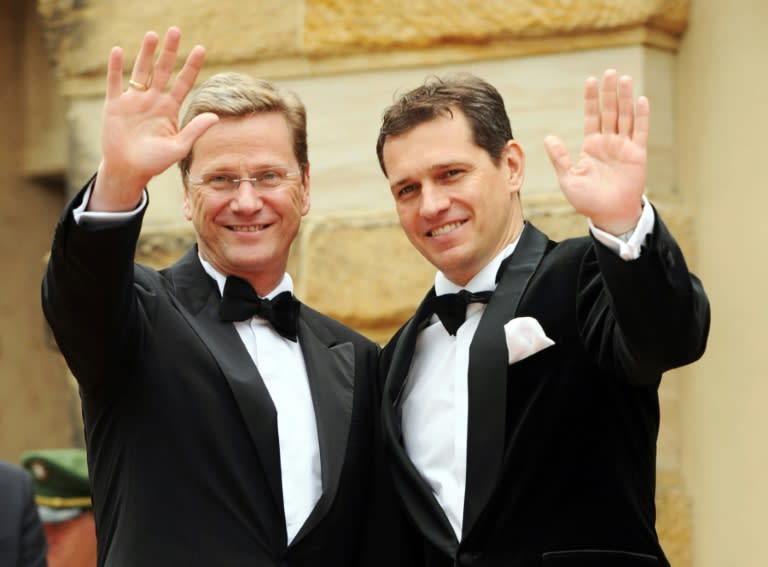German ex-foreign minister Guido Westerwelle dies
Former German foreign minister Guido Westerwelle, one of the country's best-known openly gay politicians, died Friday after a long battle with leukaemia. He was 54. The former head of the liberal, pro-business Free Democratic Party (FDP) was diagnosed with the disease in June 2014, half a year after he left his post as Germany's top diplomat. "We mourn our leader Guido Westerwelle," said his charity foundation on its Facebook page. "He died on March 18, 2016 at the Cologne University Clinic of complications from leukaemia treatment." His foundation published a photo of Westerwelle with his civil union partner, businessman Michael Mronz, and the message: "We fought. We had the goal within our sights. We are grateful for an incredibly wonderful time together. The love remains." Westerwelle, a trained lawyer and gifted parliamentary debater, had been a fixture in German politics for decades, initially in opposition. He officially "came out" as gay at Chancellor Angela Merkel's 50th birthday party in 2004 with his partner, Mronz. At the start of his term as Germany's top diplomat, Westerwelle dismissed concerns on whether his homosexuality could pose problems on official visits abroad. "Some other countries may have had a problem with the fact that Angela Merkel became the first female chancellor of Germany," he replied. "Of course she does not wear a veil on the red carpet when she visits certain Arab states." - 'Love, Death and Hope' - A protege of the FDP's former veteran foreign minister Hans-Dietrich Genscher, Westerwelle led the party's youth wing from the 1980s and became the party's youngest ever leader at age 39. In his election campaigns, he would tour the country in his "Guidomobile" campervan and once appeared on TV reality show "Big Brother". Under his leadership, the FDP in 2009 elections won almost 15 percent of the vote, its best-ever result. The FDP became junior partner to Merkel's conservatives, and Westerwelle served as vice chancellor and foreign minister. As top diplomat, he stressed the importance of post-war Germany's "culture of military restraint". The stance earned Germany withering criticism from Western partners in 2011 when it abstained from a UN Security Council resolution on establishing a no-fly zone in Libya. WikiLeaks documents revealed that US diplomats saw Westerwelle as a lightweight who was vain and critical of America. He stood down as party chief in 2011, amid bitter coalition infighting over taxes, health care and energy policy, his party's signature issue. His ministerial term ended with the FDP's devastating election loss in 2013, when it failed to cross the five-percent hurdle and was kicked out of parliament, consigning its leaders to the political wilderness. Westerwelle was diagnosed half a year later with a particularly aggressive form of leukaemia and vanished from public view, undergoing chemo- and stem cell therapy. He reappeared late last year, hopeful he had beaten cancer, when he published the book "Between Two Lives -- About Love, Death and Hope". "You can't imagine how much you are able to bear when you have to," he told an interviewer. Westerwelle won praise, even from former adversaries, for his bravery, and the news of his death Friday again sparked accolades from across the political spectrum. Merkel said she was "deeply shaken", having talked only days ago with Westerwelle's partner. "I know about the ups and downs of hopes and setbacks he and Guido Westerwelle experienced again and again over the past two years," she said. She praised her former vice chancellor and minister as a "sensitive and thoughtful person who stuck by his word" and as a politician who "with heart and passion fought for peace and human rights".




